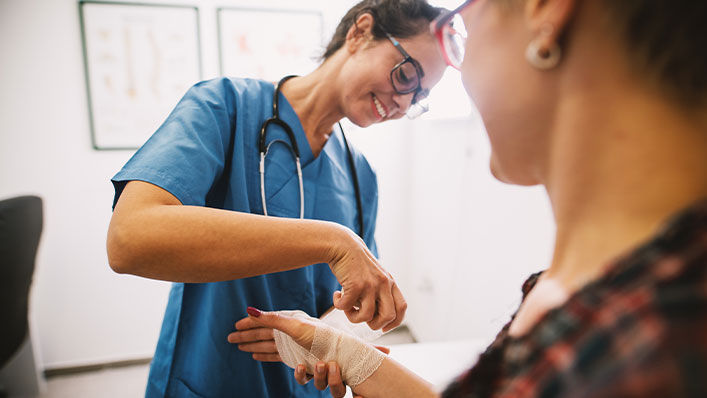Wound Healing Center
Advanced wound care center for chronic and nonhealing wounds
Most cuts and sores heal within a week or two. However, if you have a wound that lingers and won’t heal, you’re not alone. About 7 million Americans deal with chronic wounds like leg ulcers, bedsores and lacerations. In these cases, advanced wound care is needed to help you heal.
There could be many reasons your wound isn’t healing, including diabetes, kidney disease, circulatory issues, diet and age. At Amery Hospital & Clinic’s Wound Healing Center, we provide the specialized treatment needed to treat even the most complex wounds.
As a leader in chronic wound healing, we’re one of the only facilities in the Midwest that offers some of the most advanced wound care and treatment options, including hyperbaric oxygen therapy and negative pressure wound therapy. Many of our patients travel from other states to get the specialized help they need to finally heal from their wound.
Our expert team of wound healing specialists will work with you to create a personalized treatment plan that addresses your unique needs. No matter the wound, we’ve been able to help about 99%* of our patients fully recover.
There’s no reason for you to keep living with an open sore. Healing starts with your first appointment at our wound healing clinic.
Nonhealing and chronic wounds: The types we diagnose and treat
At our advanced wound care center, our skilled experts can treat a variety of chronic wounds, including:
- Bone infections
Diabetic ulcers and sores - Failed or compromised skin grafts
- Gangrene
- Lower leg ulcers and sores
- Post-operation wounds and infections
- Post-radiation burns
Pressure ulcers (bedsores)- Skin tears or lacerations
- Wounds and weeping legs from
lymphedema

The purpose of a wound center: Advanced wound healing and treatments
A wound healing specialist will assess your wound and determine the most effective types of treatment for you. Some of the following treatments may be included in your treatment plan:
Hyperbaric oxygen therapy for wound healing
Hyperbaric oxygen (HBO) therapy is a type of treatment where patients breathe 100% oxygen in an enclosed chamber. The hyperbaric chamber for wound healing is a clear cylinder where patients can lay back and relax. Our Wound Healing Center is part of the
During each
Sessions usually last between 90 minutes and two hours. We do our best to keep you entertained and comfortable during your sessions at our wound care clinic. You can choose to listen to music or watch a movie on the TV mounted above the hyperbaric chamber.
Wound debridement
Wound debridement is a minor surgical procedure where we remove unhealthy tissue from the wound. This clears dead skin, debris and infected cells from the wound to promote healthy skin growth and healing. In some cases, we’ll transfer healthy skin from another part of your body and place it over the affected area to help your body grow healthy skin over the wound. We’ll typically use local anesthesia to help keep you comfortable during this type of procedure.
Wound dressings
A wound dressing is a type of cover you wear over your wound to keep it clean and protect it from the elements. Choosing the right type of dressing for your wound goes a long way to help it heal. Our team will work with you to determine the best way to dress your wound.
Bioengineered skin substitutes
Skin substitutes are bioengineered materials that are used to cover wounds. We only use skin substitutes that closely resemble how human skin feels, looks and functions. Bioengineered skin substitutes can promote wound closing, reduce pain, speed up the healing process, and eliminate the need for surgical skin grafts. In wound healing, skin substitutes can be used for patients with:
- Burns
- Diabetes-related foot wounds
- Nonhealing surgical incisions
- Venous leg wounds
- Other chronic wounds
Negative pressure wound therapy
Negative pressure wound therapy (NPWT) is a mechanical wound treatment that uses controlled negative pressure to promote wound healing. This means that we use a vacuum-like device to remove fluids from your wound with suction. NPWT also stimulates the growth of new tissue and reduces the amount of bacteria in the wound.
Wound healing: How we know if treatment is working
During your care, our wound doctors will keep a close eye on your wound to make sure it’s responding to treatment as planned. We use the latest monitoring techniques to track your healing progress. These include:
Transcutaneous oxygen monitoring
This test records the level of oxygen available to your wound. The more oxygen your wound gets, the quicker it can heal. During this test, we’ll place a sensor on your skin that measures the oxygen in your blood.
Doppler evaluation
This test uses an ultrasound to measure the blood flow available to bring nutrients and medicines to the wound. The better the blood flow is, the quicker your wound will heal.
When to see a doctor for chronic or nonhealing wounds
The
Your primary care doctor may be able to provide some suggestions, but a wound healing center will have more treatment options. Plus, the wound care specialists at these centers are specially trained to provide advanced care for chronic or nonhealing wounds.
What can I expect at my first appointment with a wound healing specialist?
Your first appointment will include a physical examination during which the wound specialist will document the size and appearance of your wound. This will help them determine what type of wound you have – and will also help track how you’re healing once you start treatment.
The wound specialist will ask you about your medical conditions, behaviors and habits to help uncover possible reasons why your wound won’t heal and to determine additional testing that you need.
Possible tests include:
- Blood or urine tests
- Imaging tests
- Vascular studies
The wound specialist will put together a personalized treatment plan based on what they learn from your first appointment and any testing you have.
Do I need a referral to see a doctor at the Wound Healing Center?
No. You don’t need a referral to schedule an appointment at our advanced wound care center. Just call
Frequently asked questions (FAQ)
*Data results from 2022 Healogics business analytics and iHeal wound outcomes database.
